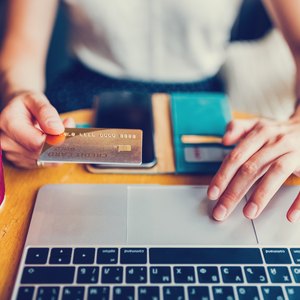
There's no hard and fast rule that says you can't open a bank account if you owe a bank money. But since many banks check credit reports and bank consumer behavior reports in order to avoid risky customers, doing so can often be difficult unless you open an account geared toward people in that situation. If you owe a particular bank money, and also have an account there, the bank usually has the right to take your funds to pay off what you owe.
Bank Consumer Behavior Reports
If you fail to pay a bank fee, bounce a check or otherwise do something that banks consider risky behavior, many financial institutions will report this to a service such as ChexSystems or Early Warning Services. Those are consumer reporting agencies somewhat similar to a credit reporting agency like Experian, Equifax or TransUnion, except that they focus in particular on consumer behavior with checking or savings accounts.
If you have black marks against you in your file with one of these companies, they can legally remain there for up to seven years, and many banks and credit unions will reject you if you apply to open a new account since they don't want to handle the risk. ChexSystems typically removes negative information after five years.
You can request copies of your reports from these companies, and if there's inaccurate information, you have the right to dispute it and ask them to correct it. But if there is accurate information as reported by the banks you've done business with, there's often little you can do except wait to have it removed.
Accounts You Can Still Open
Some banks and credit unions offer accounts sometimes called second-chance checking accounts, which are geared toward people with blemishes on their banking records. As with all bank accounts, the features they offer can vary, and some may charge fees or not even offer basic features like paper checks or debit cards, so it's usually worth shopping around for an account that meets your needs. In some cases, you can transition from a second-chance account to a traditional account with better terms.
It's also possible to use a prepaid debit card, which in many cases enables you to deposit cash and checks, receive direct deposit payments from your employer, make purchases online and in stores and withdraw cash from ATMs. These can also carry more fees than traditional checking accounts.
Check cashing stores are also an option if you simply need to cash the occasional paycheck or other check, but they also charge fees that can add up quickly.
The Right to Offset
If you owe a bank money and have accounts there or open one there, the bank will often claim the right to offset your debt by taking money from your account. This right doesn't apply to credit card debts, however, and some states limit the right to offset in order to make sure people aren't left with no funds for essential purposes and that government benefits, like Social Security payments, aren't taken.
References
- Comptroller of the Currency: Answers About General Bank Account Issues
- NerdWallet: Blacklisted by ChexSystems? What You Need to Know
- ChexSystems: FACTA Free Annual Report
- Early Warning: Consumer Services
- NerdWallet: Second Chance Checking
- Chime. "What Are My Spending Limits?" Accessed Sept. 1, 2020.
- Chime. "Free Visa Debit Card." Accessed Sept. 1, 2020.
- Wells Fargo. "Clear Access Checking Account." Accessed Sept. 1, 2020.
- Radius Bank. "Online Checking and Savings Account Rates." Accessed Sept. 1, 2020.
- Radius Bank. "Essential Online Personal Checking Account." Accessed Sept. 1, 2020.
Writer Bio
Steven Melendez is an independent journalist with a background in technology and business. He has written for a variety of business publications including Fast Company, the Wall Street Journal, Innovation Leader and Ad Age. He was awarded the Knight Foundation scholarship to Northwestern University's Medill School of Journalism.
